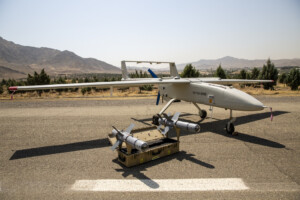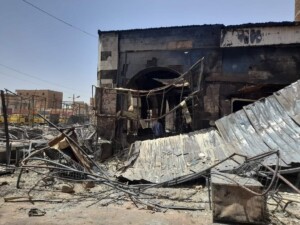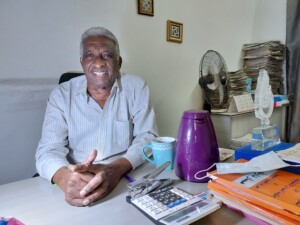How did civil discontent propel Sudan towards the overthrow of Al Bashir?
Radio Dabanga has compiled a timeline of events, to give a detailed overview of actions of and against demonstrators in the run-up to the ousting of the former president from power.
 Protestors chant slogans in Khartoum against Al Bashir and his government on 31 December 2018 (social media)
Protestors chant slogans in Khartoum against Al Bashir and his government on 31 December 2018 (social media)
On December 13, 2018, a protest about bread and fuel shortages broke out in the town of Atbara, Sudan; commentators claim that the demonstration sparked a sequence of demonstrations which led to wide-spread protests throughout Sudan.

state on 19 December 2018 (file photo)
Protests focussed on one thing, the overthrow of President Omar Al Bashir and his regime, but also touched on issues impacting people throughout Sudan, including but not limited to: a collapsed economy leading to continuously soaring prices, recurring bread and fuel shortages, huge unemployment figures particularly among graduates, and widespread corruption and clientelism.
As protests wore on, a range of people from doctors to port workers went on strike. University students held sit-ins. A 60-year-old was killed while giving medical treatment to demonstrators (Human Rights Watch reported on February 10 that Sudanese activists estimate at least 50 people have been killed since the start of the protests).
Opposition leaders spoke out against the actions of the regime. The protests reached a peak on April 6, when Sudan saw “the largest demonstrations in living memory” across the country. Tens of thousands of people demonstrated and organised a sit-in in front of the General Command of the Sudanese army in Khartoum, calling on the military to intervene in state affairs and make President Al Bashir and his government step down.
This indeed happened on April 11. Al Bashir was ousted from government, giving way to temporary rule of a Transitional Military Council. Radio Dabanga has compiled a timeline of events, to give a detailed overview of actions of and against demonstrators in the run-up to the ousting of the former president from power.
December 2018: Fractured unrest leads to widespread demonstrations

December 9-11: Employees of hospitals in El Gezira, El Gedaref, and Khartoum strike against medicine shortages and unpaid salaries. “Sudan’s medicine shortage is critical,” says the health minister.
December 12: Police on alert as fuel, bread, fuel shortages deepen across Sudan.
December 13: Students in Atbara in River Nile state protest against extremely high costs of living. Tear gas and violence is used by “security forces” (members of the security service and/or police) along with a number of arrests.
December 14-16: Students protest again in River Nile state, and also in El Fasher in North Darfur and the capital Khartoum. Security forces hit demonstrators with batons and detain some students.
December 16: Medicine prices rise by an average of 60 per cent due to falling imports and further decreasing value of the Sudanese Pound. A day later, the Central Bank of Sudan again sets a withdrawal limit for cash.
December 17-18: The first major demonstrations take place in Khartoum, El Gezira, River Nile and Red Sea states. Security forces are present in large numbers, using tear gas and violence to disperse the crowd. In Atbara the army is involved and the office of the ruling National Congress Party (NCP) is set on fire.
December 19: At least six civilian deaths among the protesters by live fire from the security forces and police are reported in El Gedaref and River Nile states. Witnesses record the violent incidents. Striking doctors in Blue Nile are arrested.
December 19-20: A state of emergency is announced in Atbara, El Gedaref, and White Nile states; schools and universities are closed.
December 20: Mobile internet providers block access to the internet and social media and chat platforms on the instruction of the government, and with it the mass flow of photos and videos emanating from the demonstrations, obstructing international online observers.
December 20: The Doctors Central Committee confirms that two protesters have been shot dead in Karima in northern Sudan by security forces. A day later, the committee reports that two students were killed by security forces during a protest in Atbara.
December 22: The security service picks up 14 members of the National Consensus Forces, a coalition of opposition parties, in Omdurman.
December 23: Opposition reports that 22 people were killed during the first days of the protests, and many were injured. A day later, Amnesty International reports that 37 protesters have been killed.
December 24: Doctors in Sudan participate in a series of strikes, followed a day later by pharmacists, as part of a series of strikes by a group of Sudanese professionals aimed at paralysing the government’s work force and stopping its resources. Dozens of Sudanese march through The Hague to the Sudanese embassy in solidarity with demonstrators in Sudan.
December 25: A large-scale protest march in Khartoum organised by the Sudan Professionals Association (SPA) – an association of doctors, teachers, lawyers and other professional groups – leads to multiple injuries after intervention by the security forces. Politicians participate, two of them are arrested. Police beat or arrest reporters and protesters who are filming. There are also protests in Port Sudan and El Gezira on this day.
December 25: The Troika (USA, U.K. and Norway) and Canada call on the Sudanese government to “respond appropriately” to protracted protests.
December 25-26: Again, two newspapers are seized for reporting on demonstrations. Al Jazeera correspondent Ahmed Alrehaid and two Sudanese journalists are injured during protests. An Arab TV correspondent is instructed to leave Sudan within 24 hours.
December 27: The Sudanese government's estimation that 19 people died and 219 civilians were injured during the demonstrations is much lower than figures of opposition and international civil society organisations.
December 27: Journalists in the capital actively participate in protest by strike; Reporters Sans Frontières is “alarmed by crackdown on the media”. The following day, three Sudanese journalists, including a correspondent, are arrested.
December 30: Imams speak out against the violence of the security forces. President Al Bashir is escorted from a mosque in Khartoum when people chant that the president must resign.
December 30: UN Secretary-General António Guterres calls for calm in Sudan.
December 31: A planned demonstration is ambushed with live fire by the security forces.
January 2019: Daily protests spread further throughout Sudan

January 1: At the initiative of the Sudanese Professionals Association, opposition coalitions and political parties sign the Declaration of Freedom and Change. Their demand: the unconditional resignation of Al Bashir and a transitional civilian government. The Sudanese Professionals Association have been the biggest driver of demonstrations until today. On the same day, 22 opposition parties report “45 civilian deaths, more than a thousand wounded, more than two thousand detained”
January 4: Another journalist is summoned to appear at the NISS office. Four journalists are being held in detention by the National Intelligence and Securtiy Service (NISS) for their reporting on the popular protests in Sudan.
January 7: Sudan’s Interior Minister says that more than 800 protesters have been arrested. A man who was wounded during the protests cannot leave the country for a medical operation abroad.
January 8: Large demonstration takes place against the deadly violence against demonstrators in El Gedaref.
January 9: At the same time as a pro-government meeting planned by the authorities in Khartoum, a major anti-government demonstration is taking place that is violently dispersed by security forces with bullets, tear gas, and batons. The central doctor’s committee confirms three civilian deaths.
January 11: The European External Action Service (EU) makes a statement that the crackdown on Sudan has an impact on “our bilateral phased relationship”.
January 13: Three journalists at work during the demonstration say they were arrested and beaten by officers. The security forces shoot at demonstrators in Khartoum North.
January 14: The security service detains 28 journalists prior to their planned protest against censorship on newspapers in Khartoum. All newspapers are instructed not to print a word about the protests. Al Bashir addresses nationals and rioters: “Elections, not protests, lead to government changes”.
January 15-17: Demonstrations in Kalakla in southern Khartoum and in Omdurman. Also in Kassala, El Gedaref, Blue Nile, El Gezira and Northern State. Members of the European Parliament urge Sudanese government to stop violence against demonstrators.
January 18: Two civilian deaths, including a doctor, by security forces during a protest in Burri in Khartoum. A third demonstrator, a student, later dies of his injuries. The security forces storm a hospital during a pursuit of protesters, using tear gas.
January 19-20: Grieving people attack a police car in the capital. The funerals lead to more protests.
January 22: Dissatisfied with all the media attention, Sudan withdraws the press permits of correspondents working for Al Jazeera English, El Arabiya TV, and the Turkish Anadolu. The print-runs of four Sudanese newspapers are confiscated. “A total of 66 journalists have been arrested” reports Reporters Sans Frontières (RSF).
January 22: The Russian Ministry of Foreign Affairs confirms that private companies have trained the Sudanese army, but denies observations of Russian cars among security forces, and denies links with Russian mercenaries.
January 24: During large protests in Khartoum two protesters are shot dead, there are several protests in other states.
January 28: The Federal Umma Party (FUP), headed by Dr Ahmed Babikir Nahar, becomes the third party to lose confidence and withdraw from the government.
January 29: Protests in Khartoum, Sennar and Northern State against the regime and to commemorate victims dispersed by tear gas and caning. Multiple newspaper print-runs are confiscated for reporting on the protests.
February 2019: Run-up to nationwide State of Emergency

in Omdurman, February 25, 2019 (RD)
February 3-5: Demonstrating teacher is tortured to death by the security services in custody in Kassala. As soon as this news reaches the public, protests start in Kassala and Khartoum North.
February 5: The security service takes leading members of the National Umma Party into custody and interrogates them. A human rights activist suffers the same fate a few days after a journalist was arrested by the security service.
February 7: President Al Bashir promises to release all journalists in custody. During the speech, the security service storms the office of a newspaper and arrests a journalist.
February 11: Demonstrations in Omdurman and Khartoum in solidarity with all women among the protesters who are still in custody takes place. Again, security officers storm a hospital where protesters have based themselves. During the following days, doctors and their trade unions speak out against the ongoing violence and demonstrate with the Sudanese Professionals Association.
February 12: Young people organize a protest in Khartoum North. University professors are arrested before the start of their planned protest.
February 13: “Nearly 30 Sudanese human rights activists are still being detained,” says the African Centre for Justice and Peace Studies.
February 14: There is a mass demonstration in Zamzam camp for displaced people in North Darfur against the rape of five women by members of a militia, as well as against the violence that demonstrators undergo in Sudan.
February 14: BBC Eye publishes its analysis of hundreds of videos which show “secret hit squads” chasing down protesters, beating them, and taking them to secret detention centres in Khartoum.
February 17: A fruit seller suffocates during a tear gas attack on a demonstration.
February 20: “79 journalists have been arrested, the majority of whom are still in detention” according to RSF and Sudanese journalist network.
February 22: In an attempt to suppress protests, President Al Bashir proclaims a national State of Emergency, and dissolves parts of the federal and state governments. Dissatisified citizens take to the streets calling for Al Bashir to step down in the capital and some other states.
February 22: The first action taken under the state of emergency is the arrest and detention of El Jareeda editor-in-chief. His family is not allowed to visit him.
February 24: Al Bashir resigns as head of the ruling National Congress Party. The new Prime Minister Ahmed Haroun is a former governor and is being sought by the International Criminal Court for war crimes and crimes against humanity in Darfur.
February 27-28: The Sudan Troika expresses its concern about the State of Emergency, and the EU High Envoy declares that they are closely following the situation in Sudan.
March 2019: Protests persist despite State of Emergency
March 1: The first emergency court cases start to trial protesters who have violated the emergency law. Lawyers work voluntarily to defend hundreds of defendants.
March 1-3: Large-scale protests against the state of emergency and the government lead to tear gas attacks, caning, and many arrests in Khartoum, El Gezira, and Northern State.
March 4-5: Protests in the run-up to a national strike action, or “civil disobedience,” are evoked by the Declaration of Freedom and Change. Many hospitals and pharmacists close their doors on the day itself. In Khartoum many streets are almost empty.

conjunction with marches for International Women's Day on March 7, 2019 (File photo)
March 7: Protests flare up in solidarity with women protestors who were detained in the run-up to International Women’s Day. A student protest in Khartoum is quelled by security forces using tear gas on campus.
March 8: Women protesters who are detained for weeks or days go on a hunger strike in Omdurman. On this International Women’s Day, President Al Bashir promises to release all women, a promise criticized for the arbitrariness of the arrests.
March 9: One of the speed courts sentences nine women to whip, which is later withdrawn.
March 10: Umma party Co-Vice-President Maryam El Sadig El Mahdi is sentenced with twelve other party members to three weeks in prison and fines respectively. Two days later, a number of women are released from Omdurman Women’s Prison.
March 13: Doctors strike in Sudanese hospitals such as El Gedaref. A number of companies and private universities in Khartoum go on strike.
March 14: More than 20 protest marches mobilise thousands of protesters in Khartoum and the eastern Sudanese states.
March 15: Elderly woman dies from complications from previous tear gas attack at her home.
March 16: A well-known eastern Sudanese activist, Jaafar El Khidir, is sentenced to one month in prison.
March 18: Security service allows four banned newspapers to publish in the run-up to a visit from an American congressman, while the editor-in-chief of El Tayyar stays in detention. Demonstrating students in the capital are arrested.
March 20: According to a committee of pharmacists, there is an ongoing shortage of medicines because Sudan has to import 70 percent of all medicines. In addition, many ATMs in Khartoum and other states are empty and salaries are not paid.
March 21: Former finance minister reports that the financial burden of the protests amounts to $500 million.
March 21: “Protest Marches for Justice” in Khartoum and six other states lead to a number of arrests, including five members of the National Umma Party.
March 22: Demonstrations in Geneva, New York and London take place at the same time as demonstrations in Khartoum after Friday prayer
March 24: A senior man dies from the complications of a previous tear gas attack.
March 25: Petrol and flour shortages lead to livestock deaths due to inactive water pumps in South Darfur, bring public transport to a halt in El Gedaref, and cause power outages in South Kordofan.
March 27: Emergency court in Omdurman sentences three protesting students to three months of “social supervision” or detention and a fine.
March 28: “Protest marches for Salvation” bring thousands of protesters on the streets of the capital, Darfur, Kordofan and eastern Sudan. Security forces use violence and tear gas against the crowds and arrest a number of people.
March 29: El Tayyar editor-in-chief Osman Mirghani is released after being held in detention for five weeks without being charged.
March 30: The head of the Sudan Call, an alliance of armed movements, opposition parties and civil society organisations, says that the “uprising has grown into broad resistance movement” as mass demonstrations take place in Khartoum, Kassala, El Gezira, Darfur, and River Nile after Friday prayers.
March 31: Siddig Yousef, a prominent member of the Communist Party of Sudan and the National Consensus Forces, is released from detention. Families of detainees hold sit-in in front of the offices of the security apparatus in Khartoum.
March 31: President Omar Al Bashir calls for the opening of all crossings between Sudan and South Sudan, and makes arrangements for a summit with President Salva Kiir in Juba, South Sudan’s capital.
April 2019: Escalation towards the topple of Al Bashir
April 1: Al Bashir admits that the “demands of Sudan’s protesters are legitimate”. A leader of the opposition predicts that “Al Bashir’s speech is proof of a failing regime”.
April 2: Vigils and protests held in run-up to April 6 mass action, in and outside the capital.
April 3: Khartoum and West Kordofan Emergency Courts sentence demonstrators and minors to imprisonment, and students are arrested ‘pre-emptively’ ahead of a planned mass demonstration in El Obeid. Three prominent ‘Sudan Future Campaign’ activists are detained.
April 4: Al Bashir calls for a dialogue with the opposition, strengthening his earlier comment by acknowledging that demonstrators have “legitimate” economic concerns. On the same day, the president agrees with Chadian President Idris Deby to work on security and stability. American senators ask US Secretary of State for clarity on Sudan policy.
April 6: Thousands march in Khartoum, gathering for the first time in front of the military headquarters. They set up camp at the complex, which also houses the president’s residence, defying attempts by police and security agents to dislodge their sit-in. Demonstrations also take place in South Kordofan, Blue Nile, Northern State, Darfur, River Nile, El Gezira, and White Nile calling for Al Bashir and his regime to step down.
April 7: Soldiers aid demonstrators during the Khartoum sit-in, signalling that the lower ranks of the army are taking the side of the opposition.

April 8: The Declaration of Freedom and Change forces seek a power transition and hold talks with the Sudan army, which is protecting Khartoum sit-in demonstrators from live fire by security agents.
April 8: Reports emerge that social media and messaging apps were blocked during the weekend, and Al Jazeera journalists are arrested and some Sudanese newspapers banned again.
April 9: Ambassadors to Khartoum meet the AU High-level Implementation Panel (AUHIP) in Addis Ababa to discuss the future of Sudan
April 9: Police follow the policy of non-intervention by the military and order their forces to not take action against the thousands at the complex. State media report that 11 people, including six members of the security forces, have been killed in one day, raising the overall official death toll in the demonstrations to 49.
April 10: Sudan Doctors Central Committee report that 21 people have been killed in four days of the Khartoum sit-in in front of the army command.
April 10: According to military leaders, including Lt Gen Mohamed Hamdan (a.k.a. Hemeti), the security committee approach President Al Bashir to find a solution to the crisis, who tells them that “we follow the Maliki doctrine which allows a leader to kill 30 per cent of his people so that the rest can live in dignity.”
April 11: Gen Ahmed Ibn Auf, First Vice-President and Defence Minister of Sudan, announces in a televised address that President Omar Al Bashir has been forced to step down after being in power for 30 years. The Defence Minister also announces a State of Emergency for three months.
Our editorial independence means that we can continue to provide factual updates about ongoing protests to Sudanese and international actors, educate people about how to avoid outbreaks of cholera, and provide a window to the world for those in all corners of Sudan. Support Radio Dabanga for as little as €2.50, the equivalent of a cup of coffee.












 and then
and then